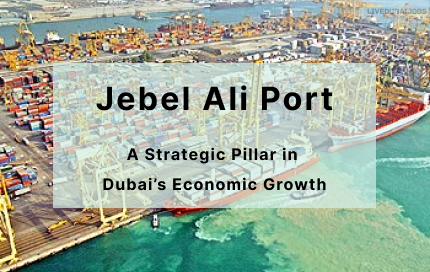Jebel Ali Port: A Strategic Pillar in Dubai’s Ambitious Economic Growth
Jebel Ali Port is still a vital component of Dubai’s transportation and logistics industry, helping to shape the emirate’s ambitions to become a major worldwide logistics hub. This importance is highlighted in a report by Emirates NBD Research, which shows how the port’s contributions extend beyond trade facilitation, influencing many industries and increasing Dubai’s economic diversity.
Jebel Ali Port’s Expanding Role in Transportation and Logistics
With Jebel Ali Port at the center of this expansion, the transportation and logistics industry made an astounding 11.5% contribution to Dubai’s GDP in 2023. The sector’s GDP increased by 5.6% annually in Q1 2024 alone, making it one of the fastest-growing economic sectors in Dubai. Thanks to its favorable location and the infrastructure that links the Middle East with international markets in Asia, Africa, and Europe, the port has continuously increased Dubai’s GDP.
Dubai’s D33 Economic Agenda, which seeks to rank Dubai among the top five global logistics hubs by 2031, is also in line with the port’s contribution. A key element of this agenda is Jebel Ali Port, which guarantees Dubai’s continued competitiveness in international trade. In 2023, Jebel Ali achieved handling volumes not seen since 2018 and regained its position among the world’s ten busiest ports with a throughput of 14.5 million TEUs. This trend continued into 2024, with 7.3 million TEUs processed in just the first half of the year.
Jebel Ali Port’s Strategic Advantage Amid Red Sea Disruptions
The need for Jebel Ali Port’s services has grown as a result of regional interruptions in Red Sea shipping routes, mostly brought on by recent geopolitical tensions. In favor of Jebel Ali’s reputable transshipment services, numerous shipping companies have changed their East-West routes, avoiding the Suez Canal and the Bab al-Mandeb Strait. The port, which links more than 600 ports worldwide and can accommodate the biggest container ships, has seen significant volumes as a result of these changes, providing shipping companies rerouting through Dubai with cost-effectiveness. Jebel Ali’s ability to handle this extra demand has proven beneficial, underscoring its strategic significance and function as a major alternate route.
The Impact of Dubai’s Growing Population on Jebel Ali Port
The demand for goods and services has surged due to Dubai’s population growth. This population growth is indicated by rising Dewa account registrations, school enrollments, and cellphone subscriptions. As a result of this expansion, more goods must be imported, primarily through Jebel Ali Port, ranging from consumer gadgets to necessities. The port also makes exports easier, with a particular emphasis on manufacturing, which fits perfectly with Dubai’s larger objectives for economic diversification.
Dubai’s aspirations for non-oil trade are supported by Jebel Ali Port in addition to its domestic trade. Jebel Ali’s strategic position and infrastructure are essential to reaching the UAE’s aim of increasing total non-oil commerce to AED 4 trillion by 2031. Dubai’s recent CEPA trade agreements, like the one with Australia, further reduce trade frictions and enhance trade volume, underscoring Jebel Ali’s role in Dubai’s expanding global footprint.
Supporting Dubai’s D33 Manufacturing and Trade Goals
Jafza, the free zone that borders Jebel Ali Port, is essential to Dubai’s trade and manufacturing industries. Jafza is home to an increasing number of businesses, with warehouse occupancy rates expected to reach 96% in 2024. The port’s multimodal transport connections facilitate the smooth flow of products, supporting Dubai’s efforts to increase industry and establish itself as a hub for regional trade. Dubai’s D33 Economic Agenda, which seeks to establish sustainable manufacturing ecosystems and strong supply chains, places a strong emphasis on this expansion.
Enhancing Dubai’s Competitive Edge in Global Trade
Dubai’s focus on boosting trade relationships with countries worldwide is bolstered by Jebel Ali Port’s capabilities. Non-oil trade exports from the UAE surged by 25% year-on-year in H1 2024, reaching Dh256.4 billion, with total trade at Dh1.4 trillion, up by 11.2%. Jebel Ali’s record-breaking throughput, paired with its strategic initiatives, positions it as an anchor for Dubai’s trade ambitions. The port has room for further expansion, with a capacity of 19.3 million TEUs, well above its current throughput levels, making it well-prepared to meet future demands.
In conclusion, Jebel Ali Port is more than just a port; it’s a dynamic force driving Dubai’s economic growth, shaping its logistics landscape, and reinforcing its position as a top global trade hub. The port’s continuous expansion, resilient infrastructure, and integral role in Dubai’s long-term economic strategy highlight its essential role in Dubai’s journey toward sustainable and diversified economic development.
For more exciting updates of Dubai, follow livedubaijobs.com





